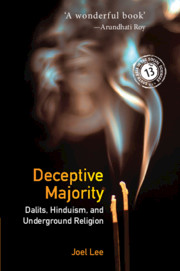Epilogue
Published online by Cambridge University Press: 15 February 2021
Summary
One morning I am taking turns reading aloud an Edgar Allen Poe story with the ten-year-old son of my friends Jagdish and Sunaina, when a ghost of sorts—a bhūt—turns up at their door. Recall that in Hindi–Urdu, the word bhūt denotes both “ghost” and “the past.” Answering the knock, Jagdish opens the door and begins conversing with some persons in the gully, apparently strangers. Then a change comes over Jagdish's voice, and he calls me over. A smiling team of two men and a woman stand outside the door, bearing clipboards and ID badges suggestive of an NGO. They are checking in with residents of the bastī, they tell us, to confirm whether their homes have actually received promised connections to the municipal sewer line currently being laid, the construction of which has thoroughly torn up the ground in this warren of lanes, rending them all but impassable. Jagdish confirms that their home has acquired a sewer connection. But he, in turn, has a question for the man in front. “Voh kya likhā hai āpke shirt pe?” Jagdish asks. What's that written on your shirt?
The man laughs nervously. He wears his white polo shirt inside out, so that the name and logo of his organization, printed over the breast pocket, are difficult to make out. But not too difficult. Reading the faint print backwards, I speak the words that caught Jagdish's eye: Harijan Sevak Sangh.
“Āīye,” says Jagdish, inviting the three inside. As he and his colleagues enter my friends’ modest home, the man explains that they have worn their shirts inside out ever since the state government banned the use of the word “Harijan” for official work. Despite its partially concealed name, though, he assures us, the Harijan Sevak Sangh is alive and well. I am surprised. How is it that this institution of the 1930s, rejected as disingenuous by Ambedkar within months of its inception, made partly redundant by the birth of the Ministry of Welfare upon Indian independence, and rendered increasingly regressive-sounding by subsequent decades of Dalit and backward caste political assertion, still exists? Moreover, having scrutinized in libraries and archives the Sangh's founding documents and internal correspondence from the 1930s and 1940s, how could I have overlooked the question of its continuation?
- Type
- Chapter
- Information
- Deceptive MajorityDalits, Hinduism, and Underground Religion, pp. 291 - 306Publisher: Cambridge University PressPrint publication year: 2021

